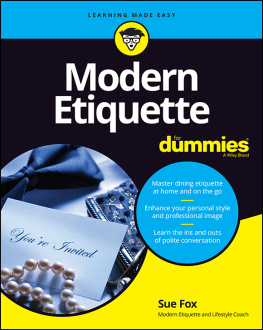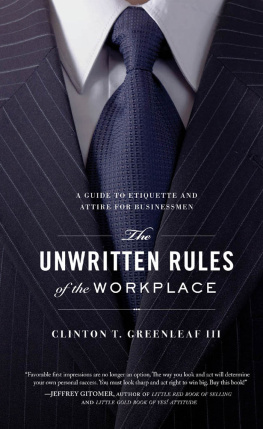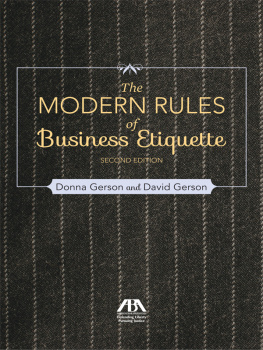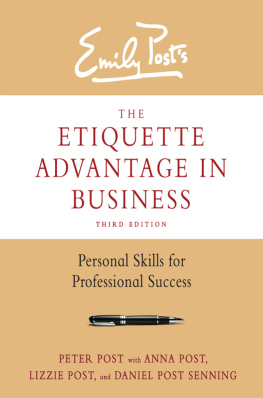THE
Etiquette
EDGE
THE
Etiquette
EDGE
The Unspoken Rules for
Business Success
BEVERLY Y. LANGFORD

American Management Association
New York Atlanta Brussels Chicago Mexico City San Francisco
Shanghai Tokyo Toronto Washington, D.C.
Special discounts on bulk quantities of AMACOM books are available to corporations, professional associations, and other organizations. For details, contact Special Sales Department, AMACOM, a division of American Management Association, 1601 Broadway, New York, NY 10019.
Tel.: 212-903-8316. Fax: 212-903-8083.
Web site: www.amacombooks.org
This publication is designed to provide accurate and authoritative information in regard to the subject matter covered. It is sold with the understanding that the publisher is not engaged in rendering legal, accounting, or other professional service. If legal advice or other expert assistance is required, the services of a competent professional person should be sought.
Library of Congress Cataloging-in-Publication Data
Langford, Beverly Y., 1942
The etiquette edge : the unspoken rules for business success / Beverly
Langford.1st ed.
p. cm.
Includes bibliographical references and index.
ISBN 0-8144-7242-7
1. Business etiquette. 2. Success in business. I. Title.
HF5389.L36 2005
395.52dc22
2005007239
2005 Beverly Y. Langford.
All rights reserved.
Printed in the United States of America.
This publication may not be reproduced,
stored in a retrieval system,
or transmitted in whole or in part,
in any form or by any means, electronic,
mechanical, photocopying, recording, or otherwise,
without the prior written permission of AMACOM,
a division of American Management Association,
1601 Broadway, New York, NY 10019.
Printing number
10 9 8 7 6 5 4 3 2 1
Contents
CHAPTER 1
Twenty-First Century Manners: Can Courtesy Survive in the Brave New World?
CHAPTER 2
Credibility: Creating It and Keeping It
CHAPTER 3
Develop Your Gratitude Attitude: Say Thank You and Mean It
CHAPTER 4
I See What Youre Saying: Are Your Unspoken Messages Telling on You?
CHAPTER 5
What the $%#*!& Is Going On Here? Should We Put a Leash on Our Language?
CHAPTER 6
Tell Me Less: Some Things Are Better Left Unsaid
CHAPTER 7
Praiseworthy Praise: Giving Compliments that Count
CHAPTER 8
What Did You Say? Developing Your Ability to Listen
CHAPTER 9
Convenience or Curse? Is It Time for a Cell Phone Reality Check?
CHAPTER 10
Travel Courtesy: Dont Leave Home Without It
CHAPTER 11
Terror on Both Sides of the Desk: Relieving Interview Stress
CHAPTER 12
The New Job: Getting Started on the Right Foot
CHAPTER 13
Office Space: Make Working Together More Enjoyable and Productive
CHAPTER 14
E-Mail: Think Before You Send
CHAPTER 15
Using the Telephone Productively: Conversations, Teleconferencing, and Voice Mail Messaging
CHAPTER 16
Are We Having a Casual Crisis? Coping with Dress Code Confusion
CHAPTER 17
Getting Along with Your Manager: Spotting and Solving Personality Problems
CHAPTER 18
Loving Your Enemies: Coping with the Price of Success
CHAPTER 19
When Your Best Friend Becomes Your Boss: Balancing the Professional and the Personal
CHAPTER 20
How to Leave a Job: Making a Graceful Exit
CHAPTER 21
Refuse to Schmooze and You Lose: Cultivating the Social Side of Business
CHAPTER 22
Lets Do Lunch: Dining Your Way to Success
CHAPTER 23
Standing Out in the Crowd: Getting Noticed Without Becoming Notorious
CHAPTER 24
He Said, She Said: When the Gender Gap Seems as Wide as the Grand Canyon
CHAPTER 25
When Silence Is Not a Virtue: Complaining Without Carping
CHAPTER 26
When an Apology Is in Order: Saying Im Sorry
CHAPTER 27
Tell It Like It Is: Delivering Unwelcome Information Without Doing Permanent Damage
CHAPTER 28
Confronting with Courtesy: Preserving Relationships While Resolving Differences
CHAPTER 29
When the Worst Happens: Dealing with Tragedy and Death
CHAPTER 30
Citizenship in the Global Village
Acknowledgments
The way that we interact with each other has been a subject of fascination for centuries, and this book is just one more look at particular facets of the process. In thinking and writing about the topic of workplace civility and the role of courtesy in personal success, I have been fortunate to benefit from the great accumulation of others ideas and writings as a foundation for my own conclusions.
Further, in writing this book, I often called on colleagues, clients, students, friends, and family to discuss various concepts and, particularly, to share their own thoughts and experiences. I am grateful to all of them for their willingness to participate and add value.
Special thanks go to my husband, Charles Boyd, whose business experience and organized thought processes helped me focus and manage the seemingly unlimited information on the subject. In addition, I am grateful to Leslie Langford and Elizabeth Boyd for their willingness to read and respond to the work at various stages. I also appreciate the expertise of editors Ellen Kadin, Ellen Coleman, and Gloria Fuzia for their valuable insights and guidance in creating the final product.
To all of you who contributed support, encouragement, and wisdom to this endeavor, I hope you will conclude that it was time well spent.
INTRODUCTION
The Case for Courtesy
Todays workplace is a more complex environment than it was just a couple of decades ago. Organizations have benefited from the richness of diversity and reduced hierarchy, but the resulting cultural complexity and diminished structure have created considerable confusion about accepted conventions of conduct and interpersonal relationships.
Customs vary, and language and social differences can make effective interaction in the workplace, as challenging as it already is, even more daunting. The old rules dont seem to work anymore; we need new practical guidelines to avoid confusion, or even chaotic behavior.
Unfortunately, since the late sixties and early seventies, many people have considered courtesy old fashioned and good manners elitist. At the same time, many of us are increasingly frustrated with rudeness or social ineptness among employees, customers, coworkers, and strangers. Yet most of us will readily admit that our parents concepts of good manners dont always work in the twenty-first century.
The Value of Courtesy to Your Career


















